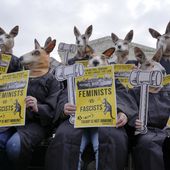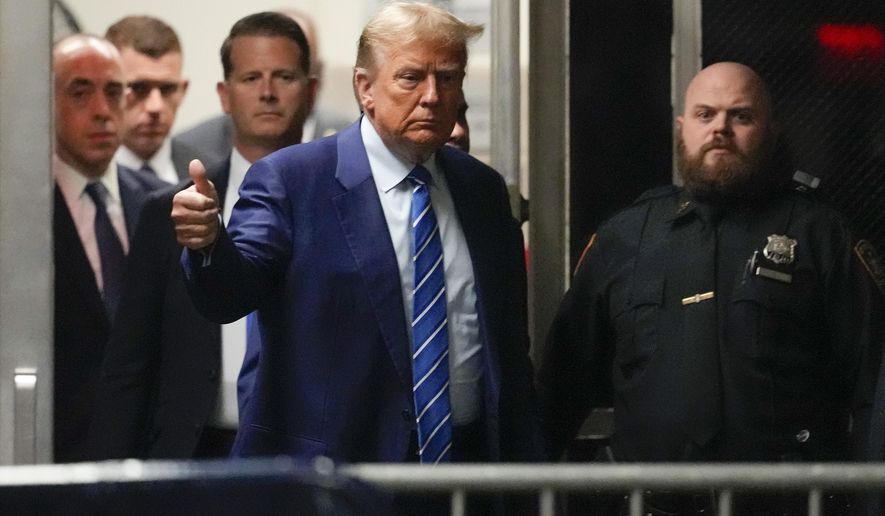Former President Donald Trump sat quietly through a second day of New York jury selection Tuesday but perked up when one juror said he’d read a couple of the ex-president’s books.
The potential juror, a slim older man with dark-rimmed glasses, said he read “The Art of the Deal” and “How to be Rich.” Some of his wife’s family members are Republican lobbyists.
“I don’t think there’s anything that would prevent me from being a fair and impartial juror,” said the man, who works in sales and is from Boston, though he has lived in New York for three decades.
He also said, “I feel that no one’s above the law.”
After a stretch of being still, Mr. Trump flipped through the jury questionnaire as the man answered its questions.
Another juror, who is a lawyer, said he was a “big fan of ‘The Apprentice’ when I was in middle school,” referring to Mr. Trump‘s reality television show.
SEE ALSO: Trump bashes gag order, wants to counter people ‘lying’ on TV
On Mr. Trump‘s presidency, he said: “Some things I agreed with, some things I disagreed with.”
Mr. Trump is facing trial on 34 counts of falsifying business records. Prosecutors say he criminally concealed hush money payments to porn star Stormy Daniels and two others around the 2016 campaign by marking them as legal reimbursements to his then-lawyer, Michael Cohen.
Mr. Trump has pleaded not guilty and denied having an affair with Ms. Daniels, who claimed the pair had a sexual encounter nearly two decades ago.
Defense lawyer Todd Blanche appeared to be taking notes about each juror on Tuesday and smiled at some of their answers.
Mr. Trump stared straight ahead most of the time and signed a waiver so that he did not have to attend all of the sidebar conversations his attorneys had with the judge.
Counsel for both sides got a chance to question jurors.
SEE ALSO: Prosecutors call on judge to hold Trump in contempt over social media posts
A prosecutor, Joshua Steinglass, asked jurors whether they’d heard about the case from the news and their opinions about the judicial system.
“I do believe we have a great judicial system,” one woman said. “It could use some tweaking in some places.”
Mr. Blanche, meanwhile, said the trial is unique because everyone knows the defendant.
“We all know that every one of you knows President Trump,” he said. “And you all know him in different ways and you all have different views of him based upon on different factors in your life. “
One female juror said she did not have an opinion on Mr. Trump.
“Especially in this courtroom he will be treated as anyone else can be treated and no one is above the law,” she said. “I am here for my civic duty. I’m here to listen to the facts.”
Many jurors tried to separate the narrative around Mr. Trump from their potential duties as jurors.
One man, a Mexico native who became a U.S. citizen in 2017, downplayed the significance of his immigration story. Mr. Trump built his political brand in 2015 and 2016 by pushing for tougher border policies.
“Feelings are not facts,” said the man. “I’m very grateful to be an American and that happened on the first year that he was president.”
Jurors also agreed that Mr. Trump tends to speak his mind — something they found admirable or grating.
“I want to say some things to people but my momma said be nice,” one man said.
One potential juror, an accountant originally from Dallas, was excused after he waffled on whether he could be politically unbiased.
In the accounting world, he said, “A lot of people tend to intellectually slant Republican … so there could be some unconscious bias.”
Also, he said his Texas background could make him biased, but he was “not sure.”
Judge Juan Merchan said the court needed an unequivocal stance, prompting the man to say: “It’s probably going to be tough for me to be impartial.”
Another juror was dismissed because, on further reflection after day one, she concluded she could not be fair and impartial. A bearded man, with sunglasses hanging from his button-up shirt, also said he couldn’t be impartial and was dismissed.
Others were dismissed because of scheduling or work conflicts with the trial, and one woman said she followed anti-Trump newsletters and social media.
A Black woman from Harlem, describing herself as “creative at heart,” seemed to say that she didn’t believe Mr. Trump is responsible for partisanship, when asked whether she had a strong opinion of him.
“There was a divide in the country and I can’t ignore that,” she said. “However, I never equated that to one individual.”
A woman from the Upper West Side said she had a court date of her own across the street on April 30, though the judge said he could “work around that.”
One young woman said she could be fair and impartial but wanted to know if the trial would conflict with her sister’s wedding in September.
“If we’re still here in September, that would be a big problem,” the judge quipped.
• Tom Howell Jr. can be reached at thowell@washingtontimes.com.




Please read our comment policy before commenting.